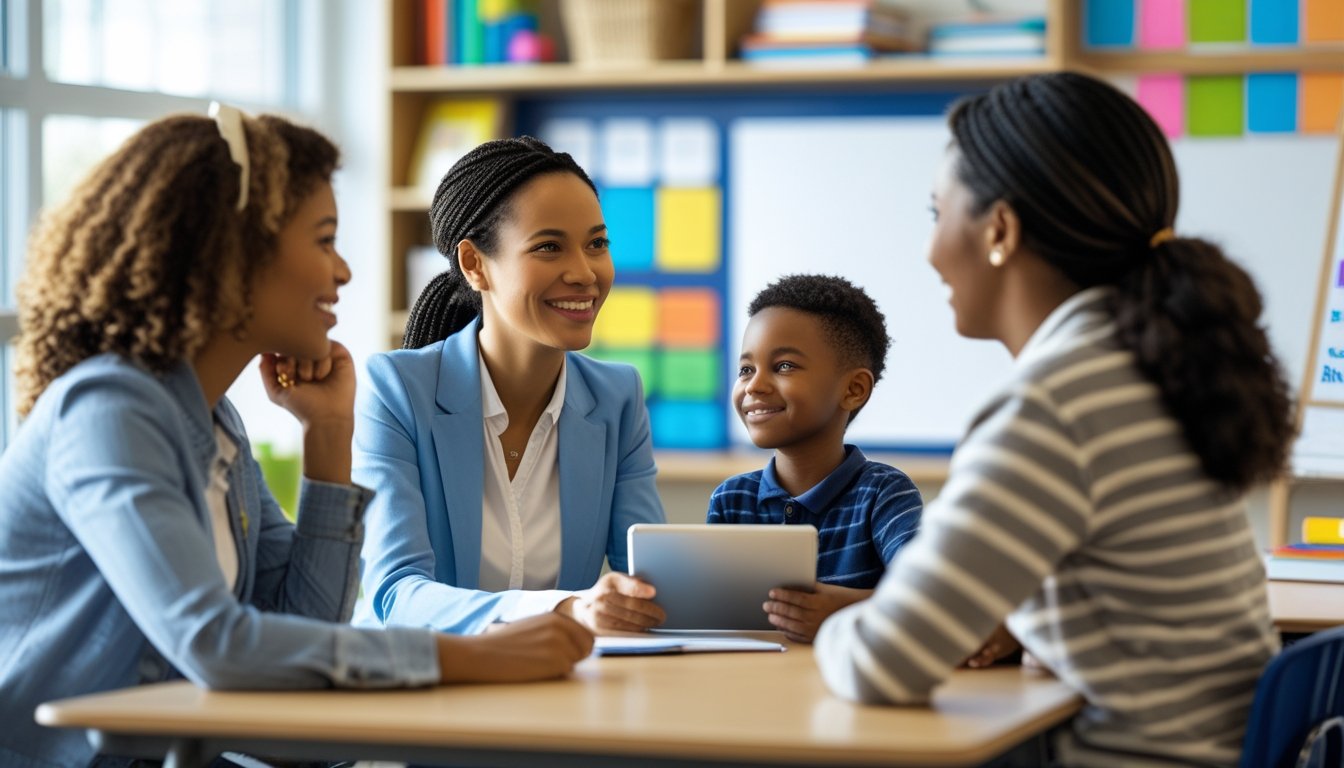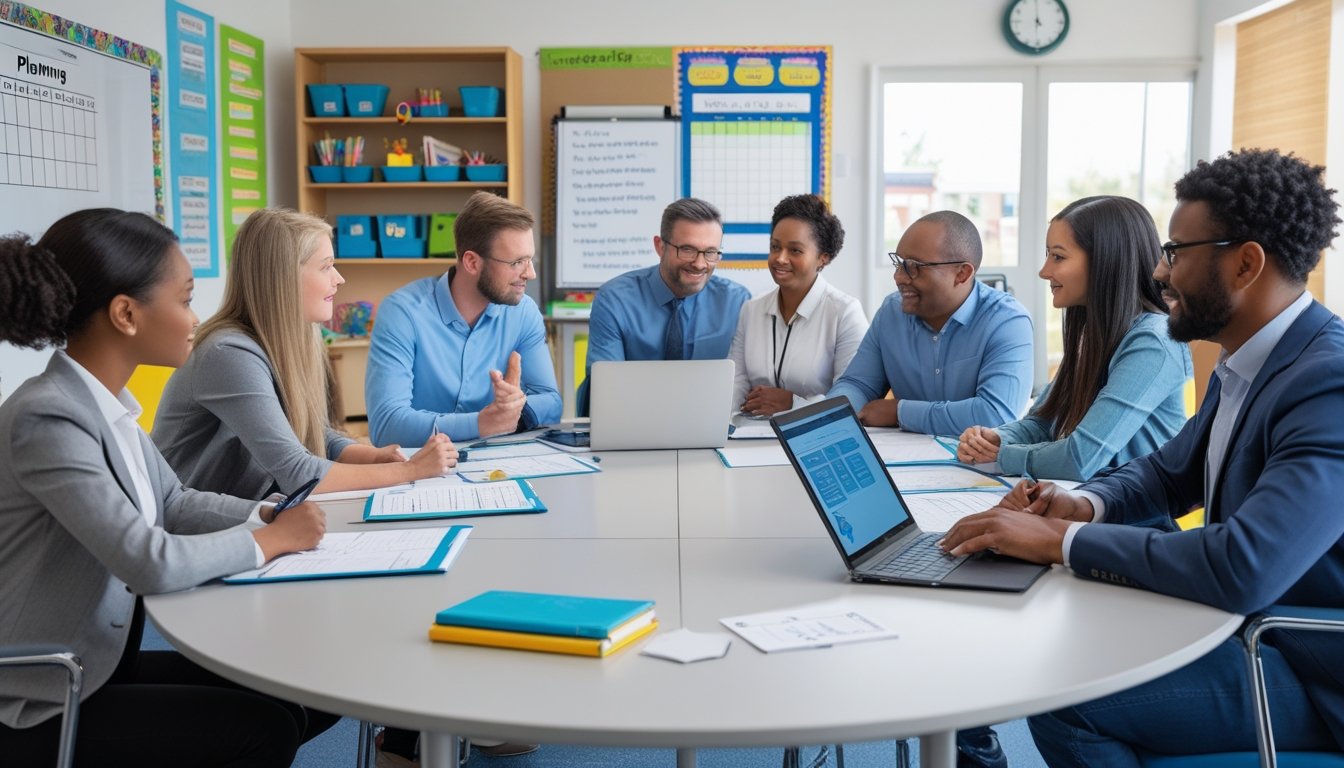Late updated: 01 Jun 2025 11:06
Written by:
Maximising Success In Parent-Teacher Meetings: Effective Strategies and Tips
Engaging in effective communication with your child’s teacher can significantly impact their educational experience. To make the most of parent-teacher meetings, focusing on clear and specific objectives allows us to bridge the gap between home and school effectively. By coming equipped with insights about academic progress and behavioural aspects, we ensure that these meetings are fruitful and targeted.

Understanding the needs and concerns of both parents and educators is crucial. We can structure these meetings to foster a supportive and cooperative environment. Ensuring translators are available and providing flexible scheduling options like online meetings can accommodate diverse needs and preferences, making the experience inclusive for everyone.
Collaborating on actionable plans during these meetings helps us support our child's learning journey. Encouraging open dialogue and creating a list of follow-up steps to reinforce progress highlights the partnership's shared goals. With these strategies, parent-teacher meetings can become powerful tools in nurturing our children’s development.
Key Takeaways
- Set specific goals to enhance meeting impact.
- Foster cooperation with tailored communication methods.
- Agree on follow-up steps to support progress.
Core Strategies for Maximising Parent-Teacher Meetings
In parent-teacher conferences, a structured and clear approach encourages meaningful dialogue and promotes the student's success. Establishing clear aims, using effective communication, and fostering positive relationships lays the groundwork for these productive meetings.
Setting Clear Objectives
Before we attend a parent-teacher conference, setting clear objectives is crucial. This preparation involves identifying key topics we wish to discuss, such as the child's academic progress or any behavioural concerns.
We should also consider any questions we may have about specific subjects or the student's social development. Documenting these goals enables us to stay focused and ensures that critical issues aren't overlooked.
Prioritising these objectives helps balance various aspects of the child's education, making the discussion more productive. Understanding the desired outcomes aids in establishing a framework for the conversation that aligns with both the parents' and the teacher's expectations, ensuring everyone is on the same page.
Effective Communication Techniques
Effective communication is the bedrock of successful parent-teacher conferences. Using clear and straightforward language, we can articulate our concerns or observations without ambiguity. It's vital to listen actively and encourage feedback by asking open-ended questions.
This two-way exchange allows us to gain valuable insights into the student's daily experiences and offers opportunities to clarify any misunderstandings. When discussing sensitive topics, maintaining a positive and empathetic tone enables us to address challenges without creating defensiveness.
Using written notes or summaries can serve to recap the discussion, ensuring that important points are not forgotten and providing a record for future reference. These practices help in maintaining a constructive dialogue that facilitates student success.
Building Positive Relationships
Nurturing positive relationships between parents and teachers enhances collaboration. Trust is essential, and establishing a rapport starts with open dialogue and mutual respect. Expressing appreciation for the teacher's efforts helps in recognising their role in the child's education.
Sharing regular updates about the student's progress or difficulties provides a strong foundation for ongoing engagement. We must also remain approachable and be willing to adjust our approach when necessary to address any individual needs.
A collaborative partnership allows us to work together towards common goals, keeping the child's best interests at the forefront. This ongoing relationship strengthens our ability to support the student's academic and personal growth effectively.
Practical Planning and Follow-Up for Parent-Teacher Conferences

Effective parent-teacher conferences begin with thorough preparation and conclude with constructive follow-up actions. By organising necessary documentation, utilising scheduling tools, and fostering participation in social skills development, these meetings can greatly benefit a child’s learning experience.
Preparing Conference Forms and Materials
Organising essential materials ahead of time ensures a seamless conference experience. Conference forms should capture fundamental details such as the student’s academic progress, behavioural notes, and goals for the next term. Including sections for parental feedback is also useful.
Having supplementary materials like student work samples ready can help illustrate key discussion points. This preparedness allows us to engage parents with clear evidence, setting a constructive tone for collaborative improvement.
Using Online Tools Like Sign Up Genius
Scheduling can be streamlined using digital tools to set up appointments efficiently. Sign Up Genius facilitates hassle-free scheduling by providing a platform where parents can select a time slot that suits them. This reduces back-and-forth communication, freeing up time for substantive preparation.
We can also use such platforms to send reminders, ensuring higher attendance rates. Incorporating such technology makes the process less cumbersome and more effective, allowing educators to concentrate on the key aspects of the child's education.
Encouraging Engagement in Social Skills Development
Engaging parents in the development of their child’s social skills is integral. Conversations should address both academic and social development, recognising that these aspects are interconnected. We should encourage parents to observe and discuss their child’s interactions with peers and adults.
Strategies for social skill enhancement can be collaboratively developed during these discussions. Offering practical tips for reinforcement at home can strengthen these skills, ultimately supporting the child’s overall growth and integration within the school environment.
Frequently Asked Questions

Effective parent-teacher conferences require clear strategy, mutual preparation, and actionable agendas. Building strong partnerships between parents and teachers enhances student learning.
What strategies can teachers employ to ensure a productive parent-teacher conference?
Teachers can focus on maintaining a welcoming environment and setting clear objectives. Utilising active listening skills to understand parents' concerns and acknowledging both strengths and areas for improvement fosters a collaborative spirit during discussions.
What critical points should parents prepare to discuss during a parent-teacher meeting?
Parents should identify specific areas of concern or interest regarding their child’s performance and behaviour. Highlighting observations about homework, social interactions, and health are valuable. Bringing questions about academic progress or support needed helps in addressing specific issues effectively.
What constitutes an effective agenda for a parent-teacher conference?
An effective agenda includes discussing academic achievements, behavioural trends, and any social or emotional concerns. Allocating time to set goals and discussing future plans ensures all relevant topics are covered, making the meeting concise yet comprehensive.
How can parents and teachers form an effective partnership in a student's education?
Communication is key. Regular updates through emails or meetings and openness to feedback strengthen this partnership. Jointly setting educational goals for the student and ensuring consistent follow-ups creates a supportive learning environment.
What checklist items are essential for teachers to prepare for a parent-teacher conference?
Teachers should review students' academic records and prepare progress reports. Having examples of students’ work and a summary of their strengths and challenges is critical. Ensuring materials and resources are organised beforehand guarantees an efficient use of time.
What preparation can parents do to maximise the benefits of a parent-teacher meeting?
Parents can start by reviewing past assignments and reports. Making notes on any questions or concerns they have will guide the conversation. Asking their children for feedback and areas they wish to discuss can also provide additional insights to share during the meeting.
